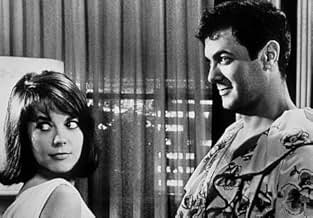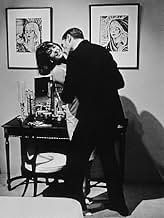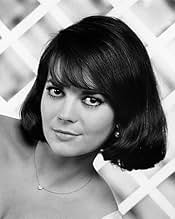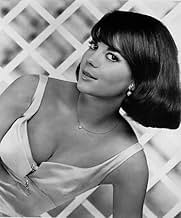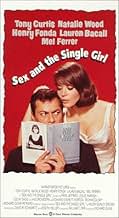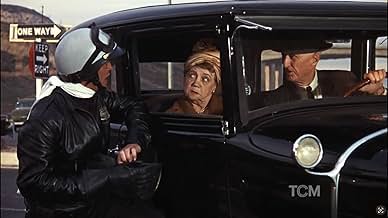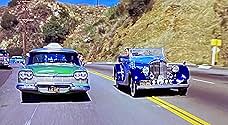PUNTUACIÓN EN IMDb
6,4/10
5 mil
TU PUNTUACIÓN
Bob Weston es el editor de una publicación que se vanagloria de difamar a los protagonistas de sus artículos. Su próxima víctima será la psicóloga Helen Brown, autora de una guía de mujeres ... Leer todoBob Weston es el editor de una publicación que se vanagloria de difamar a los protagonistas de sus artículos. Su próxima víctima será la psicóloga Helen Brown, autora de una guía de mujeres solteras.Bob Weston es el editor de una publicación que se vanagloria de difamar a los protagonistas de sus artículos. Su próxima víctima será la psicóloga Helen Brown, autora de una guía de mujeres solteras.
- Dirección
- Guión
- Reparto principal
- Premios
- 1 nominación en total
John Alban
- Nightclub Patron
- (sin acreditar)
Reseñas destacadas
There is something infectious about this comedy. The cast is about as perfect as you can get, but the subject matter was a bit awkward when compared to today's mores.
Before Carrie Bradshaw there was Helen Gurley Brown (Natalie Wood) a real life psychologist and businesswoman (she was editor of Cosmo for 32 years). Ms. Brown has just written a very controversial book about sex and the single girl (hence the title). It creates a firestorm amongst her male colleagues and her conservative patients. Tony Curtis is Bob Weston, a writer for a sleazy National Enquire-esque magazine called Stop. Bob wants to get an interview with Ms. Brown, but pretends to be a patient in need of marital counseling as a ruse. He uses his next door neighbors', Frank (Henry Fonda) and Syvia (Lauren Becall), volatile marriage as material. Of course a romance blossoms and then the normal confusion and hijinks ensue.
My issue with the film is the way Ms. Brown is portrayed. She is a befuddled, confused and weak female. She's also a terrible therapist. Despite writing a book on how a single girl can be successful, she immediately allows herself to become involved with a married patient. If I was the real Helen Brown, I would be appalled. Ms. Wood is gorgeous and I'm captivated by her screen presence, but she plays Ms. Brown as a woman who needs a man...the exact opposite of the book she wrote and my recollections of Ms. Brown in real life (mostly from reading her biography).
I understand this was set in the 1964 when views of male/female relationship skewed more towards male dominance, but it was still hard for me to accept that Ms. Brown could accomplish so much while being so desperate for a man...and a married one at that. Her therapy techniques violate every code of ethics you can imagine. Sure, it was a funny movie and I enjoyed it, but it left me feeling awkward at how simple women were portrayed.
The supporting cast is top notch and the movie's best selling point. Fonda and Bacall as the bickering neighbors are a treat. Mel Ferrer as Brown's fellow psychologist and potential love interest is hilariously smarmy and cocky. Fran Jeffries and Leslie Parish are attractive and funny love interests/secretary for Bob. Larry Storch appears in a cameo as a motorcycle cop during the finale's odd highway chase scene. Count Basie and his orchestra are here just to provide some gravitas, but don't really play any key roles.
There is a running gag about Tony Curtis wearing a woman's robe and everyone referring to him as Mr. Lemon. Curtis and Jack Lemon had starred in "Some Like It Hot" a few years before where they dressed like women. The gag was funny the first two times, but it got overplayed.
I have to say something about the chase scene. It seems that every romantic comedy in the 1960s had a chase scene. This one had a funny idea of the first three cars tossing a quarter to the toll taker. The last car leaves a dollar and takes the 75 cents. It was silly, poorly filmed, but made me laugh. Then there is another similar thing involving pretzels which I simply did not understand. I'm sure there was a point, but I missed it.
With this much talent, it was going to succeed and it does. I just wish Ms. Brown had been played a bit more wisely and not as such an easy mark for Tony Curtis' Bob Weston.
Before Carrie Bradshaw there was Helen Gurley Brown (Natalie Wood) a real life psychologist and businesswoman (she was editor of Cosmo for 32 years). Ms. Brown has just written a very controversial book about sex and the single girl (hence the title). It creates a firestorm amongst her male colleagues and her conservative patients. Tony Curtis is Bob Weston, a writer for a sleazy National Enquire-esque magazine called Stop. Bob wants to get an interview with Ms. Brown, but pretends to be a patient in need of marital counseling as a ruse. He uses his next door neighbors', Frank (Henry Fonda) and Syvia (Lauren Becall), volatile marriage as material. Of course a romance blossoms and then the normal confusion and hijinks ensue.
My issue with the film is the way Ms. Brown is portrayed. She is a befuddled, confused and weak female. She's also a terrible therapist. Despite writing a book on how a single girl can be successful, she immediately allows herself to become involved with a married patient. If I was the real Helen Brown, I would be appalled. Ms. Wood is gorgeous and I'm captivated by her screen presence, but she plays Ms. Brown as a woman who needs a man...the exact opposite of the book she wrote and my recollections of Ms. Brown in real life (mostly from reading her biography).
I understand this was set in the 1964 when views of male/female relationship skewed more towards male dominance, but it was still hard for me to accept that Ms. Brown could accomplish so much while being so desperate for a man...and a married one at that. Her therapy techniques violate every code of ethics you can imagine. Sure, it was a funny movie and I enjoyed it, but it left me feeling awkward at how simple women were portrayed.
The supporting cast is top notch and the movie's best selling point. Fonda and Bacall as the bickering neighbors are a treat. Mel Ferrer as Brown's fellow psychologist and potential love interest is hilariously smarmy and cocky. Fran Jeffries and Leslie Parish are attractive and funny love interests/secretary for Bob. Larry Storch appears in a cameo as a motorcycle cop during the finale's odd highway chase scene. Count Basie and his orchestra are here just to provide some gravitas, but don't really play any key roles.
There is a running gag about Tony Curtis wearing a woman's robe and everyone referring to him as Mr. Lemon. Curtis and Jack Lemon had starred in "Some Like It Hot" a few years before where they dressed like women. The gag was funny the first two times, but it got overplayed.
I have to say something about the chase scene. It seems that every romantic comedy in the 1960s had a chase scene. This one had a funny idea of the first three cars tossing a quarter to the toll taker. The last car leaves a dollar and takes the 75 cents. It was silly, poorly filmed, but made me laugh. Then there is another similar thing involving pretzels which I simply did not understand. I'm sure there was a point, but I missed it.
With this much talent, it was going to succeed and it does. I just wish Ms. Brown had been played a bit more wisely and not as such an easy mark for Tony Curtis' Bob Weston.
"Mention sex, and the single girl is cool and shy
She objects to discussing sex with any guy
You can bet she's as interested as he
If sex weren't 50-50, where would everybody be?"
I love me a sex comedy from 1964 that openly acknowledges female desire, sex outside of marriage, erogenous zones, and male impotence. "I'm gaining confidence," says Tony Curtis in one scene, clearly alluding to an erection. Meanwhile Natalie Wood is, well, Natalie Wood, just as gorgeous and magnetic as ever, even if it's in a silly film like this. This cast, my god ... Wood, Curtis, Henry Fonda, Lauren Bacall, Mel Ferrer (loved his little dancing), Edward Everett Horton (age 78!), Otto Kruger (his last film) ... with music from Count Basie and the sultry Fran Jeffries - it's fun to see them all here, and they all get at least a moment or two to shine.
The film tries to do a little too much, adding on the zaniness of an extended chase scene at the end which got a little exhausting. I liked the quieter things early on, like the running gag of coin-operated machines (the water cooler, the bathroom sink, the mirror, etc) which are all cleverly slipped in, and maybe suggest a changing world, one which goes along with women acknowledging their physical desires. There are also several humorous references to Jack Lemmon in "Some Like it Hot" when Tony Curtis finds himself in a women's robe, even though of course Curtis himself was in the same film. And then we have the scenes with Wood staring into Curtis's eyes and becoming aroused by his ear kissing, or her prancing out to answer the phone in a low-cut dress saying "And I shall insist on the right to have as many love affairs as I please. I'm certainly not going to sacrifice one iota of my freedom or dignity for any man." My goodness, she's a joy to watch.
Where the film falters, however, is in its treatment of women in the workplace - there's a secretary who is clearly a sexual plaything of her boss, and the main character melts as soon as she meets her new patient, abandoning any kind of professionalism. The story is kicked off when tabloid magazine writers all wonder if this young psychologist is a virgin, and her colleagues wonder the same thing. That's kind of ironic, because Helen Gurley Brown's book is about acknowledging and even using sexuality for one's benefit in a savvy way - a controversial concept for a feminist to be sure - but Wood's character doesn't show signs of this, and if anything, she's pretty naïve. It kind of erodes the equality aspect of the film. Women are as sexual as men, it says, but they either want to be dominated (as Jeffries' character prefers at the end) or they don't mind sacrificing their careers to get married (as Wood and Bacall's characters do).
Hey, the film is just a playful little comedy and in 1964 I guess you could look at it as a stepping stone of feminism, just as Brown's book was, despite its mix of progressive and regressive content - but these overtones and the lengthy car chase prevented me from rating it higher. Worth watching though.
I love me a sex comedy from 1964 that openly acknowledges female desire, sex outside of marriage, erogenous zones, and male impotence. "I'm gaining confidence," says Tony Curtis in one scene, clearly alluding to an erection. Meanwhile Natalie Wood is, well, Natalie Wood, just as gorgeous and magnetic as ever, even if it's in a silly film like this. This cast, my god ... Wood, Curtis, Henry Fonda, Lauren Bacall, Mel Ferrer (loved his little dancing), Edward Everett Horton (age 78!), Otto Kruger (his last film) ... with music from Count Basie and the sultry Fran Jeffries - it's fun to see them all here, and they all get at least a moment or two to shine.
The film tries to do a little too much, adding on the zaniness of an extended chase scene at the end which got a little exhausting. I liked the quieter things early on, like the running gag of coin-operated machines (the water cooler, the bathroom sink, the mirror, etc) which are all cleverly slipped in, and maybe suggest a changing world, one which goes along with women acknowledging their physical desires. There are also several humorous references to Jack Lemmon in "Some Like it Hot" when Tony Curtis finds himself in a women's robe, even though of course Curtis himself was in the same film. And then we have the scenes with Wood staring into Curtis's eyes and becoming aroused by his ear kissing, or her prancing out to answer the phone in a low-cut dress saying "And I shall insist on the right to have as many love affairs as I please. I'm certainly not going to sacrifice one iota of my freedom or dignity for any man." My goodness, she's a joy to watch.
Where the film falters, however, is in its treatment of women in the workplace - there's a secretary who is clearly a sexual plaything of her boss, and the main character melts as soon as she meets her new patient, abandoning any kind of professionalism. The story is kicked off when tabloid magazine writers all wonder if this young psychologist is a virgin, and her colleagues wonder the same thing. That's kind of ironic, because Helen Gurley Brown's book is about acknowledging and even using sexuality for one's benefit in a savvy way - a controversial concept for a feminist to be sure - but Wood's character doesn't show signs of this, and if anything, she's pretty naïve. It kind of erodes the equality aspect of the film. Women are as sexual as men, it says, but they either want to be dominated (as Jeffries' character prefers at the end) or they don't mind sacrificing their careers to get married (as Wood and Bacall's characters do).
Hey, the film is just a playful little comedy and in 1964 I guess you could look at it as a stepping stone of feminism, just as Brown's book was, despite its mix of progressive and regressive content - but these overtones and the lengthy car chase prevented me from rating it higher. Worth watching though.
I was reading in the Citadel Film Book Series The Films Of Lauren Bacall that the real Helen Gurley Brown was less than thrilled with the film made of her work which was a landmark in feminist literature. Turning it into a poor man's version of a Rock Hudson-Doris Day sex comedy she probably never envisioned.
The Rock and Doris roles are taken by Tony Curtis and Natalie Wood. Tony plays a writer for a Confidential style magazine, today it would be the National Enquirer. He's already done articles debunking her credibility as far as being an expert on sex. Now Curtis proposes to publisher Edward Everett Horton to really get to know this person and embarks on a campaign to seduce the sex expert with all the cunning of Ashton Kutcher on the punk. But as what happens in all these films he actually falls for her.
Of course it doesn't help that he gets in to see her pretending he's hosiery manufacturer and neighbor Henry Fonda and using his marital problems with Lauren Bacall as his entry to the pop psychologist's office. In this film Helen Gurley Brown is not the editor of Cosmopolitan Magazine, but a Joyce Brothers type psychologist.
I wish I could remember who said it, but I read a review of this film once where the reviewer said that the parts Fonda and Bacall played in cheaper productions years ago would have been played by Edgar Kennedy and Dot Farley. I should only have said something that brilliant. Watching Fonda I did see traces of the slow burn and Bacall is certainly more chic than Dot Farley. Nevertheless the way they bicker at each other could be the best thing about Sex And The Single Girl. Neither Fonda or Bacall is terribly proud of Sex And The Single Girl. I wonder what could have induced them to appear in this film?
It's not the worst film that any of the leads or an exceptionally talented name cast of character players ever appeared in. Still these kind of films were being turned out regularly in the late Eisenhower- Kennedy years and this one dates real badly.
Helen Gurley Brown's name and real contributions to feminism have stood the test of time better than this film has.
The Rock and Doris roles are taken by Tony Curtis and Natalie Wood. Tony plays a writer for a Confidential style magazine, today it would be the National Enquirer. He's already done articles debunking her credibility as far as being an expert on sex. Now Curtis proposes to publisher Edward Everett Horton to really get to know this person and embarks on a campaign to seduce the sex expert with all the cunning of Ashton Kutcher on the punk. But as what happens in all these films he actually falls for her.
Of course it doesn't help that he gets in to see her pretending he's hosiery manufacturer and neighbor Henry Fonda and using his marital problems with Lauren Bacall as his entry to the pop psychologist's office. In this film Helen Gurley Brown is not the editor of Cosmopolitan Magazine, but a Joyce Brothers type psychologist.
I wish I could remember who said it, but I read a review of this film once where the reviewer said that the parts Fonda and Bacall played in cheaper productions years ago would have been played by Edgar Kennedy and Dot Farley. I should only have said something that brilliant. Watching Fonda I did see traces of the slow burn and Bacall is certainly more chic than Dot Farley. Nevertheless the way they bicker at each other could be the best thing about Sex And The Single Girl. Neither Fonda or Bacall is terribly proud of Sex And The Single Girl. I wonder what could have induced them to appear in this film?
It's not the worst film that any of the leads or an exceptionally talented name cast of character players ever appeared in. Still these kind of films were being turned out regularly in the late Eisenhower- Kennedy years and this one dates real badly.
Helen Gurley Brown's name and real contributions to feminism have stood the test of time better than this film has.
What could have been a sharp satire on 60's sexual attitudes runs basically lame throughout, the script simply comes up short. The basic mistaken identity plot device fails to provide laughs and it is so much the base of the film's story that it's failure prevents the whole from going anywhere.
However, all is not lost. There is a saving grace, and that is the presence of the then 25 year old Natalie Wood, playing the sexologist Helen Gurley Brown.
Wood, in this film is staggeringly pretty. She had, at that age, a natural girl next door beauty that has rarely if ever been rivaled in film history. Seeing this film and Wood again recently for the first time in decades was a revelation. About her, not the mediocre film.
However, all is not lost. There is a saving grace, and that is the presence of the then 25 year old Natalie Wood, playing the sexologist Helen Gurley Brown.
Wood, in this film is staggeringly pretty. She had, at that age, a natural girl next door beauty that has rarely if ever been rivaled in film history. Seeing this film and Wood again recently for the first time in decades was a revelation. About her, not the mediocre film.
Like it's literary namesake, this film is a campy relic from the dawn of the sexual revolution. However unlike the aforementioned book, this film is a whole lot of fun! Natalie Wood manages to hit her stride, squeezing the maximum humor from a deadpan delivery. Tony Curtis is smarmy, smug and loving it. Henry Fonda is having a ball, and Lauren Becall is the undisputed queen of droll comedy.
These performances are the highlights of a sophisticated romp, early 60's LA style. Mel Fererr's martini dance should be an inspiration to lounge swingers everywhere. From the cartoon credits, to the Sexy Sox showroom, to the hilarious freeway chase scene, it's all winking nodding blur of couches, crewcuts and cocktails. Great fun viewing for single girls and guys.
These performances are the highlights of a sophisticated romp, early 60's LA style. Mel Fererr's martini dance should be an inspiration to lounge swingers everywhere. From the cartoon credits, to the Sexy Sox showroom, to the hilarious freeway chase scene, it's all winking nodding blur of couches, crewcuts and cocktails. Great fun viewing for single girls and guys.
¿Sabías que...?
- CuriosidadesIn her contract for this film, Natalie Wood required Warner Bros. to provide a portable trailer, white cigarette holders from London, oil gardenia from Cairo, days off when she was on her menstrual cycle, and a $160,000 salary.
- PifiasNone of the cabs have meters in them.
- Citas
Helen Gurley Brown: You know, when you smile like that, you *do* look like Jack Lemmon!
- ConexionesFeatured in Cinema: Alguns Cortes - Censura III (2015)
Selecciones populares
Inicia sesión para calificar y añadir a tu lista para recibir recomendaciones personalizadas
- How long is Sex and the Single Girl?Con tecnología de Alexa
Detalles
- Fecha de lanzamiento
- País de origen
- Idioma
- Títulos en diferentes países
- El Sexo y la Joven Soltera
- Localizaciones del rodaje
- Sepulveda Blvd., Los Ángeles, California, Estados Unidos(long chase sequence, through Sepulveda Pass, alongside the 405 Freeway)
- Empresas productoras
- Ver más compañías en los créditos en IMDbPro
Taquilla
- Recaudación en todo el mundo
- 6490 US$
- Duración
- 1h 50min(110 min)
- Relación de aspecto
- 1.85 : 1
Contribuir a esta página
Sugerir un cambio o añadir el contenido que falta


